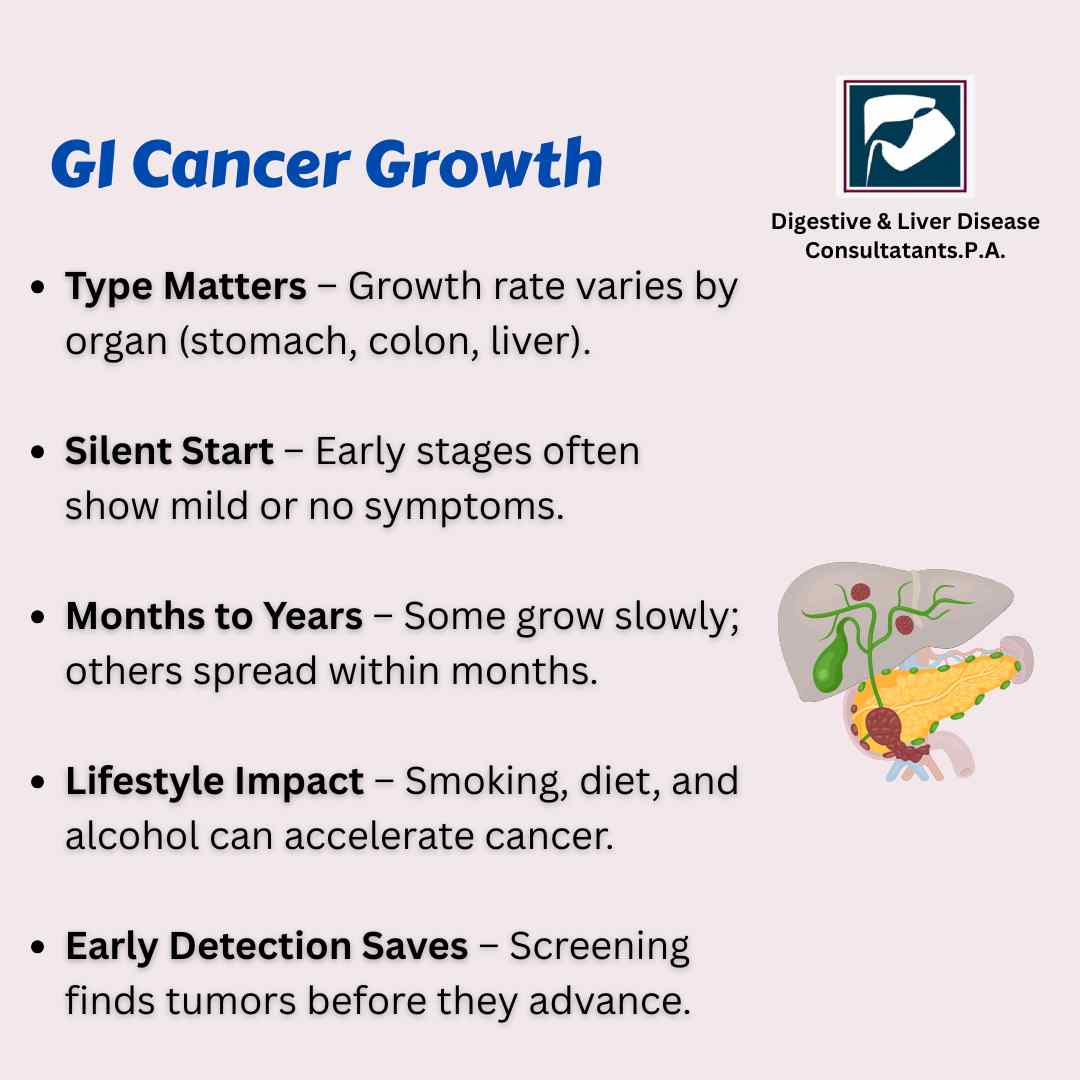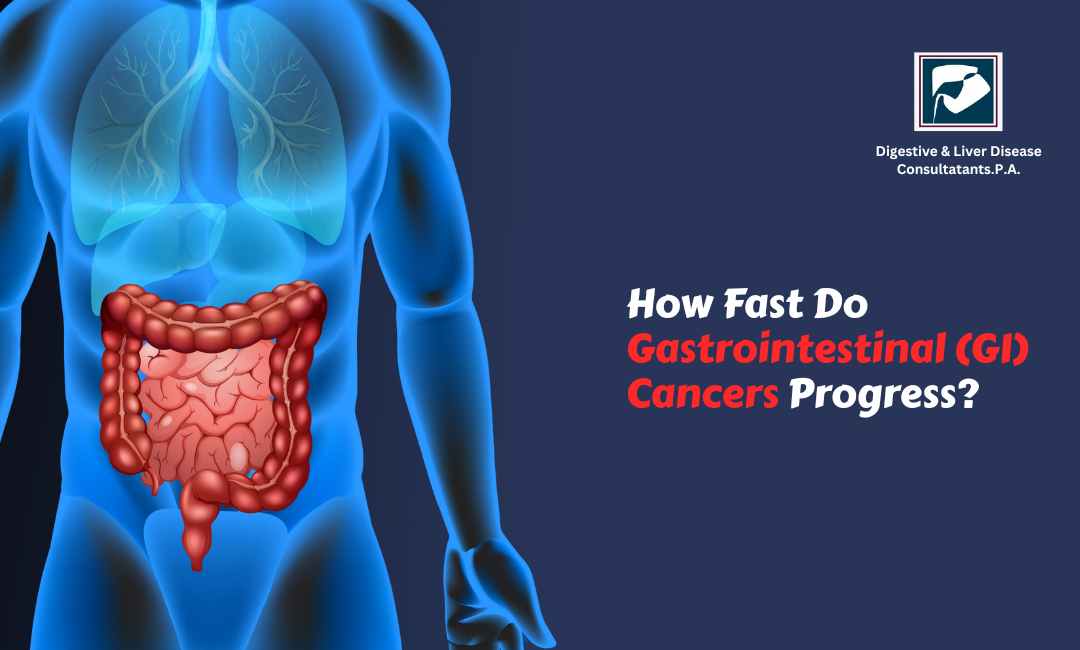Gastrointestinal (GI) cancers include a group of cancers that affect the digestive system — such as the esophagus, stomach, liver, pancreas, colon, and rectum. These cancers can behave very differently depending on where they begin, how early they are detected, and the patient’s overall health.
Many people wonder how quickly GI cancers progress and whether they can spread silently. The truth is, some GI cancers develop slowly over several years, while others can advance more rapidly. Understanding how these cancers grow and what signs to watch for is essential for early detection and effective treatment.
What Are Gastrointestinal (GI) Cancers?
GI cancers start in the organs that make up the digestive tract. The most common types include:
Esophageal cancer – affects the tube connecting the throat to the stomach.
Stomach (gastric) cancer – begins in the lining of the stomach.
Liver cancer – usually starts in liver cells (hepatocellular carcinoma).
Pancreatic cancer – develops in the pancreas, an organ behind the stomach.
Colorectal cancer – affects the colon or rectum, often starting from polyps.
Gallbladder and bile duct cancers – less common but still part of the GI system.
Each of these cancers has a unique growth rate and pattern of progression.

How Fast Do GI Cancers Grow?
The speed at which GI cancers progress depends on several factors, including the cancer type, location, genetic mutations, and whether it’s detected early or late. Let’s look at how some major GI cancers behave:
1. Colorectal Cancer
Colorectal cancer often develops slowly. It usually begins as small, noncancerous polyps in the colon or rectum. Over the course of 10 to 15 years, some of these polyps can turn cancerous. This slow progression is why routine colonoscopy screening is so effective — it allows doctors to find and remove polyps before they become cancer.
Once colorectal cancer forms, it can spread locally through the colon wall and then to nearby lymph nodes or distant organs like the liver or lungs if not treated early.
2. Stomach Cancer
Stomach (gastric) cancer generally progresses more quickly than colon cancer. It often begins with subtle changes in the stomach lining, sometimes related to chronic infection with Helicobacter pylori bacteria. Early-stage stomach cancer may remain unnoticed because symptoms like bloating, indigestion, or mild stomach pain seem harmless.
Once it becomes invasive, stomach cancer can spread through the lymphatic system or bloodstream within months to years, depending on its aggressiveness.
3. Pancreatic Cancer
Pancreatic cancer is known to be one of the fastest-progressing GI cancers. It often shows few symptoms until it reaches an advanced stage. Studies suggest that it can progress from a localized tumor to metastatic disease in less than a year.
Because the pancreas is located deep in the abdomen, detecting small tumors early is difficult. This is why pancreatic cancer often requires urgent, aggressive treatment once diagnosed.
4. Liver Cancer
Liver cancer can grow quickly, particularly if it develops in a liver already damaged by conditions such as hepatitis B, hepatitis C, or cirrhosis. Tumors can double in size within a few months in aggressive cases.
However, early-stage liver cancer can sometimes be treated successfully with surgery, liver transplantation, or ablation if detected before it spreads.
5. Esophageal Cancer
Esophageal cancer tends to progress at a moderate rate. It often starts with precancerous changes called Barrett’s esophagus, which may take several years to turn into cancer. Once invasive cancer develops, it can spread to nearby structures and lymph nodes within months to a few years.
Factors That Influence How Fast GI Cancers Progress
While each cancer type behaves differently, certain factors affect how quickly any GI cancer might grow or spread:
Genetics: Some people inherit mutations that make cells more likely to turn cancerous.
Lifestyle factors: Smoking, alcohol, poor diet, obesity, and chronic infections can accelerate disease progression.
Immune system strength: A weakened immune system may allow cancer to grow unchecked.
Stage at diagnosis: Cancers found early are often smaller and confined to one area. Later-stage cancers tend to grow and spread faster.
Tumor biology: Some tumors have aggressive molecular features that make them more likely to invade surrounding tissue.
Why Early Detection Is Critical
The earlier GI cancers are found, the better the outcomes. In early stages, treatment options are often less invasive and more successful. For example:
- Colon cancer can be prevented entirely by removing polyps during colonoscopy.
- Early-stage stomach or esophageal cancers can sometimes be removed with endoscopic surgery.
- Liver and pancreatic cancers have higher survival rates when detected before they spread.
Regular screenings like colonoscopies, imaging tests, and lab work can identify problems long before symptoms appear.
Warning Signs to Watch For
Some early warning signs of GI cancers include:
- Persistent abdominal pain or bloating
- Unexplained weight loss
- Fatigue or weakness
- Difficulty swallowing
- Changes in bowel habits (constipation or diarrhea)
- Blood in stool or dark tar-like stools
- Loss of appetite or feeling full quickly
- Jaundice (yellowing of the skin or eyes)
If you experience any of these symptoms, especially for more than a few weeks, schedule an evaluation with a gastroenterologist.
How Are GI Cancers Diagnosed?
Diagnosis often involves a combination of imaging, endoscopy, and lab tests:
Endoscopy or colonoscopy: To visualize the digestive tract and collect tissue samples.
CT scan or MRI: To see tumor size, spread, or liver involvement.
Biopsy: Confirms whether cells are cancerous.
Blood tests: May detect tumor markers or liver function abnormalities.
At Digestive & Liver Disease Consultants, P.A., our gastroenterologists use advanced diagnostic tools to identify GI cancers early and accurately, allowing for the best possible treatment outcomes.
About Digestive & Liver Disease Consultants, P.A.
Digestive & Liver Disease Consultants, P.A. is dedicated to providing expert care for patients with digestive and liver disorders, including gastrointestinal cancers. Our board-certified gastroenterologists specialize in cancer prevention, early detection, and treatment coordination.
We offer advanced endoscopic procedures, imaging, and screening programs to help patients maintain digestive wellness. From colon cancer prevention to liver disease management, we deliver personalized, compassionate care for every patient.
Conclusion
The speed at which gastrointestinal cancers progress varies, but one thing is certain — early detection saves lives. Some GI cancers grow slowly, offering time for intervention, while others can advance rapidly without warning. Regular screenings, healthy lifestyle habits, and prompt medical attention for digestive symptoms are the best defenses against late-stage cancer.






